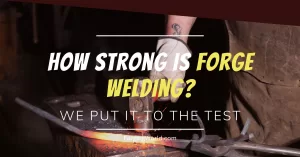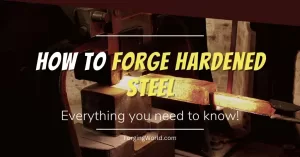Backyard forging, or the practice of forging metal in a residential backyard, has gained popularity in recent years. It allows enthusiasts to create unique and personalized metal items without the need for expensive equipment or a dedicated workshop.
However, as with any activity involving fire and hot metal, backyard forging requires strict adherence to rules and regulations to ensure safety, environmental responsibility, and legal compliance.
In this blog post, we’ll explore the rules and regulations you need to know before starting your own backyard forging hobby.
Is It Illegal to Have a Forge in Your Backyard?
In general, most people can legally have a forge in their residential backyard. However, some areas have zoning laws, environmental regulations, or noise ordinances that prohibit or restrict backyard forging.
So, it’s critical to check with your local government offices, such as the Department of Environmental Quality, the Department of Health, or the Department of Planning and Zoning, to find out about the rules and regulations in your area.
Backyard Forging Safety Rules and Regulations
Safety is paramount when it comes to backyard forging. The following universal rules and regulations must be followed:
Safety Equipment:
Forging is a dangerous hobby and you should take all the necessary precautions to keep yourself safe. This includes wearing thick protective clothing, steel-toe boots, eye protection, and a face shield. It’s also important to have fire extinguishers nearby in case of an emergency.
Ventilation:
The fumes from the forge can be dangerous so proper ventilation is essential. Open windows or place a fan near the forge and ensure that there is enough airflow.
Fireproof Area:
Keep your forging area away from combustible materials like wood, paper, and dry grass. Be sure to keep plenty of sand nearby in case of an emergency.
Supervision:
Forging should only be done with adult supervision present at all times.
Environmental Regulations:
Backyard forging produces smoke, soot, and ash, which can be hazardous to the environment if not managed properly. Make sure you are aware of local regulations regarding how much smoke and soot you can emit and always dispose of your ash safely.
Fuel Storage:
Before you decide whether or not to start forging in your backyard, you should consider how you will store your fuel. You must have a secure and safe storage space for all of your fuel, such as propane or charcoal, in order to comply with regulations and keep your home safe.
Backyard Forging Environmental Rules and Regulations
Backyard forging can have an impact on the environment, and it is essential to understand the rules and regulations that govern this activity.
The following rules and regulations must be followed:
Pollution Monitoring:
You should monitor your smoke and soot emissions to ensure that you’re not violating any local regulations.
Metal Shavings:
Any metal shavings created during forging must be disposed of properly. This includes keeping them in containers and disposing of them at a recycling center.
Waste Oil:
Always dispose of your used oil properly, and never dump it into the environment or down any drains.
Air Quality:
You must maintain clean air quality in your area and be aware of local requirements.
Waste Disposal:
Any metal waste created by backyard forging must be disposed of safely and legally. Make sure you are aware of the regulations in your area.
Water Use:
Backyard forges use water for cooling and must be managed in accordance with local regulations.
How to Check Local Rules and Regulations
The rules and regulations for forging in your backyard can vary depending on where you live.
In general, you can find this information by contacting your local government offices, such as the Department of Environmental Quality, the Department of Health, or the Department of Planning and Zoning.
Here are some specific steps you can take to find the regulations in your area:
Check local zoning laws: Many areas have zoning laws that dictate what types of activities are allowed in residential areas. Check with your local planning and zoning department to see if backyard forging is permitted in your area.
Contact your local environmental department: Depending on where you live, there may be regulations related to air quality or waste disposal that apply to backyard forging. Contact your local environmental department to see if there are any specific rules you need to follow.
Look for noise regulations: Backyard forging can be noisy, so there may be noise regulations in your area that apply. Check with your local government to see if there are any noise restrictions that apply to your backyard forge.
Join a local blacksmithing organization: Local blacksmithing organizations can be a great resource for finding out about rules and regulations in your area. Members of these organizations are often knowledgeable about local laws and can provide guidance and support.
Conclusion
In conclusion, backyard forging can be a fun and fulfilling activity, but it requires strict adherence to rules and regulations to ensure safety, environmental responsibility, and legal compliance.
By following the guidelines outlined in this blog post, you can enjoy the hobby while minimizing the impact on your environment and complying with the law.
Remember, safety should always be your top priority when practicing backyard forging.
Stay safe and have fun!


